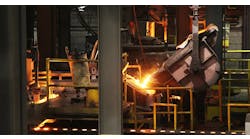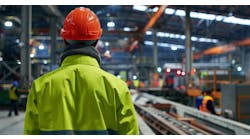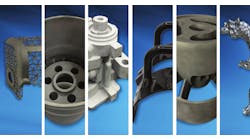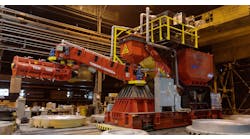EPA UPDATES POLLUTANT MONITORING REQUIREMENTS
The EPA has changed its national air quality monitoring regulations as part of a strategy to update technology and keep pace with more advanced approaches to air quality management.
The rule will change the locations of some types of monitors, add new monitors for some pollutants, and allow states and tribes to shut down unneeded monitors for some pollutants. The rule also will add more monitors capable of providing real-time measurements for some pollutants.
The changes affect six common pollutants, known as ‘criteria pollutants,’ and the pollutants that form them. These criteria pollutants are: ground-level ozone; carbon monoxide; nitrogen dioxide; sulfur dioxide; particle pollution (also known as particulate matter); and lead.
The national network of monitors will continue for each pollutant, but the improved network will be more strategic and efficient.
For more information, contact EPA or visit www.epa.gov
OSHA FINES COLUMBUS STEEL CASTINGS
The U.S. Dept. of Labor’s Occupational Safety and Health Administration (OSHA) leveled fines totaling $257,000 against Columbus Steel Castings Co., Columbus, OH, for two repeat and 59 other serious violations of federal workplace safety and health standards.
OSHA officials began an investigation at the steel foundry in March 2006, based on injury and illness data reported by the business, and following complaints and two accidents earlier this year.
The two repeat violations stem from an October 2003 investigation, when Columbus Steel Castings was cited for missing or inadequate standard guardrails and inadequate guarding of vertical belts.
OSHA filed 59 citations against Columbus Steel Casting for “serious” violations ranging from confined spaces, lockout/tagout issues, and problems with overhead cranes and forklifts, to electrical hazards, inadequate machine guarding, and improper storage of oxygen and fuel-gas cylinder.
According to OSHA procedures, Columbus Steel Castings has 15 working days upon the receipt of the citations to appeal the fines before the independent OSHA Review Commission.
HEXION AGREES TO CLEAN-AIR ORDER
The U.S. EPA Region 5 issued an administrative consent order to Hexion Specialty Chemicals Inc., Carpentersville, IL, requiring installation and operation of additional emissions monitoring equipment at its chemical manufacturing plant.
The new equipment will continuously monitor a system that controls volatile organic compound emissions. It must destroy at least 90% of VOC emissions from Hexion’s manufacturing process.
The order resolves EPA allegations that Hexion violated its state operating and construction permits and federal and state regulations by improperly operating its VOC controls.
VOCs contribute to the formation of ground-level ozone, or smog.
RULING HELPS PACIFIC STEEL CASTING AVOID SHUTDOWN
In late September a San Francisco federal court denied Communities for a Better Environment (CBE) a preliminary injunction to close down Pacific Steel Casting in Berkeley, CA, the nation’s fourth largest foundry.
The CBE filed a suit under the Clean Air Act against the foundry, challenging the company to reduce its air emissions to legal limits. Under the CBE request, the foundry would have exceeded acceptable levels of emissions in about 30 days and would have been forced to close its doors, according to PSC.
“Our workers and their families are relieved that the judge saw they had no facts to back up their claims,” said PSC v.p. of operations Joe Emmerichs.
Federal judge Bernard Zimmerman wrote: “I cannot conclude that plantiff demonstrates a likelihood of success in proving a permit violation … I further conclude that, although plaintiff establishes a potential for some harm to the community if an injunction is not granted, the harm is not the type that would normally impel a court to grant plaintiff’s request.”
Pacific Steel Casting still faces two lawsuits from Neighborhood Solutions and the Bay Area Air Quality Management District, both concerning odor from foundry emissions. Pacific Steel Casting is installing a remediation system at its No. 3 plant to reduce the odor, similar to installations at the Nos. 1 and 2 plants in 1991 and 1995, respectively.
OSHA AWARDS OVER $10M IN TRAINING GRANTS
OSHA has awarded more than $10 million in Susan Harwood Training Grants to 57 nonprofit organizations for safety and health training and educational programs. The grants support the development of training materials and the provision of safety programs to educate Hispanic and other limited-English proficient employees, hard-to-reach employees in small businesses; and employees in highly hazardous industries.
The NonFerrous Founders’ Society will receive $117,450 in grants to develop a training program on workplace emergency planning and disaster response and recovery. The program will address emerging public health and preparedness issues, including diagnosis, prevention, safety precautions, surveillance, control, and treatments. Seminars will target small-business owners and managers in the cast-metals industry. Course material will be offered in Spanish and English.








